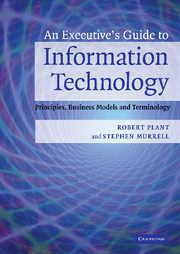Book contents
- Frontmatter
- Contents
- Introduction
- A ACM (Association for Computing Machinery) to Audio
- B Backup to Business process re-engineering
- C C, C++, C# to Cracking
- D Database to Dynamic web pages
- E e-Commerce/e-business to European Union Directive on Privacy and Electronic Commerce 2002
- F Fiber optics to Fuzzy logic
- G to H Global positioning system to Hypertext, HTML
- I ICANN (Internet Corporation for Assigned Names and Numbers) to ISP (Internet service provider)
- J to L Java to Logic programming
- M Machine learning to Multicast
- N Natural language processing (NLP) to Normalization
- O Object-oriented to Outsourcing
- P Packet switching and circuit switching to Public key-private key
- Q to R Quantum computing to RSS (Really simple syndication)
- S Sarbanes-Oxley Act of 2002 (SOX) to Structured design methodologies
- T to U T-Carrier to URL (Uniform resource locator)
- V Value added network (VAN) to Voice over IP (VoIP)
- W W3C (the World Wide Web Consortium) to WYSIWYG
- X to Z X.12 to Zip
- Index
- References
Q to R - Quantum computing to RSS (Really simple syndication)
Published online by Cambridge University Press: 17 May 2010
- Frontmatter
- Contents
- Introduction
- A ACM (Association for Computing Machinery) to Audio
- B Backup to Business process re-engineering
- C C, C++, C# to Cracking
- D Database to Dynamic web pages
- E e-Commerce/e-business to European Union Directive on Privacy and Electronic Commerce 2002
- F Fiber optics to Fuzzy logic
- G to H Global positioning system to Hypertext, HTML
- I ICANN (Internet Corporation for Assigned Names and Numbers) to ISP (Internet service provider)
- J to L Java to Logic programming
- M Machine learning to Multicast
- N Natural language processing (NLP) to Normalization
- O Object-oriented to Outsourcing
- P Packet switching and circuit switching to Public key-private key
- Q to R Quantum computing to RSS (Really simple syndication)
- S Sarbanes-Oxley Act of 2002 (SOX) to Structured design methodologies
- T to U T-Carrier to URL (Uniform resource locator)
- V Value added network (VAN) to Voice over IP (VoIP)
- W W3C (the World Wide Web Consortium) to WYSIWYG
- X to Z X.12 to Zip
- Index
- References
Summary
Foundation Concept: Bit.
Definition: The use of quantum mechanics, the laws governing sub-microscopic particles, in the construction of computing and communication devices.
Overview
Quantum computing is firmly in the domain of science fiction, and can be expected to stay there for quite some while. Very basic experiments confirming that the underlying ideas are at least viable have been performed successfully, but the construction of usable computing or communications devices is at best very distant. We are currently at a stage akin to having discovered that electricity does actually exist; people can start thinking about the possibility of building computers, but the possibility is far off, and it may never happen.
Quantum mechanics governs the behavior of very small particles, single atoms and smaller, and shows that they do not behave as experience of the larger world would lead us to expect. The two key concepts that might turn out to be practically useful are Superposition and Entanglement.
In conventional computing, a switch or logic element is either on or off, 1 or 0. Ten logic elements give ten things that can be on or off in any combination, resulting in 2 × 2 × 2 × 2 × 2 × 2 × 2 × 2 × 2 × 2 = 1024 different states. A search through 1024 possibilities is performed by stepping 10 such elements through all possible combinations of states in turn.
Information
- Type
- Chapter
- Information
- An Executive's Guide to Information TechnologyPrinciples, Business Models, and Terminology, pp. 277 - 288Publisher: Cambridge University PressPrint publication year: 2007
